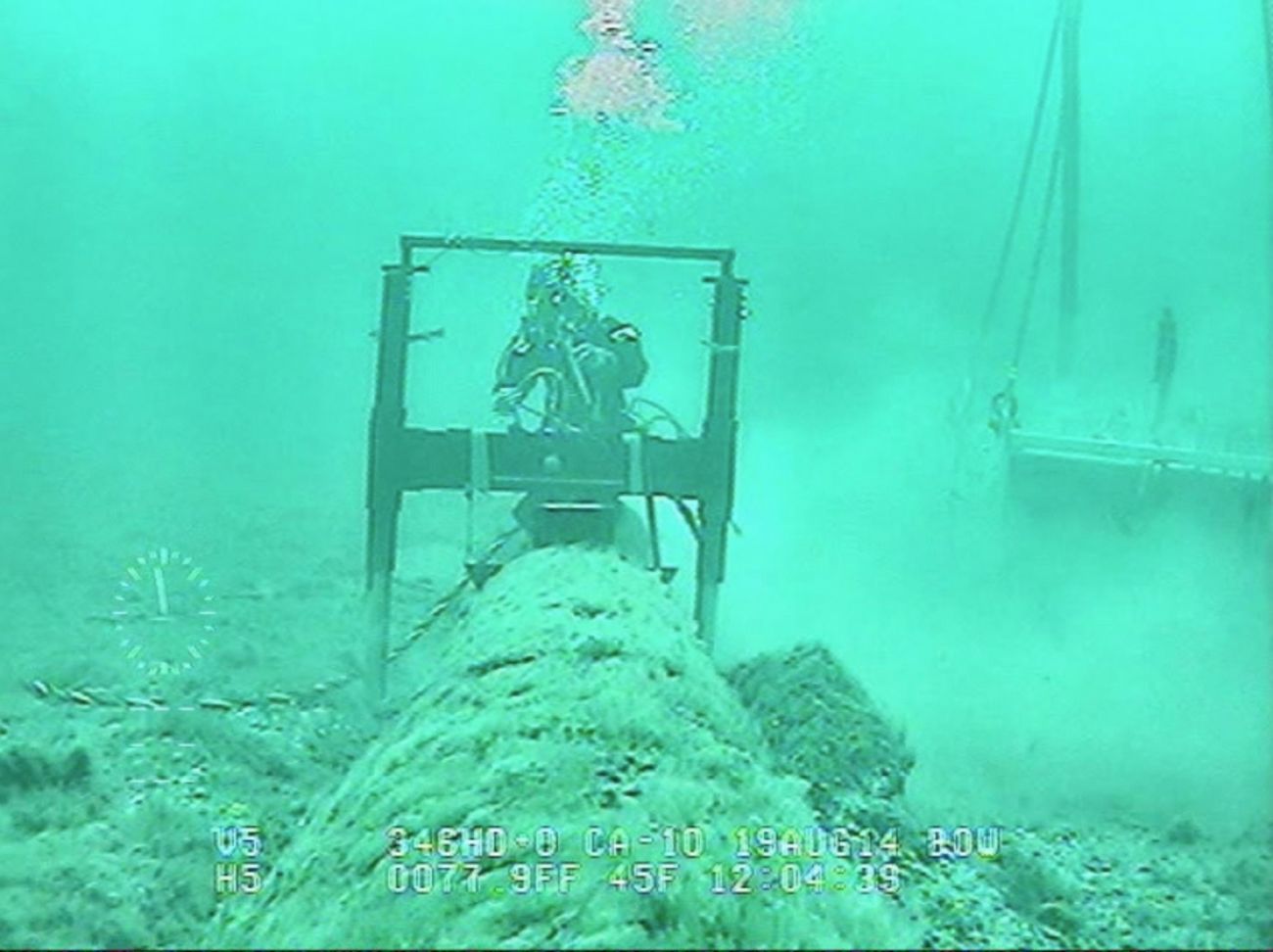
By Kelly House, Bridge Michigan
The Great Lakes News Collaborative includes Bridge Michigan; Circle of Blue; Great Lakes Now at Detroit Public Television; and Michigan Radio, Michigan’s NPR News Leader; who work together to bring audiences news and information about the impact of climate change, pollution, and aging infrastructure on the Great Lakes and drinking water. This independent journalism is supported by the Charles Stewart Mott Foundation. Find all the work HERE.
Tack another delay onto the Line 5 tunnel construction timeline.
Federal regulators this week announced they will thoroughly examine the potential environmental impacts of Enbridge Energy’s plan to encase the petroleum pipeline inside of a tunnel beneath the Straits of Mackinac, a review that could take years.
The decision by the U.S. Army Corps of Engineers all-but-guarantees something that had become increasingly evident over the past year: Enbridge Energy’s plan to begin building the tunnel this year and complete it by 2024 is not realistic.
Instead, tunnel construction may not begin for years, if it happens at all.
One study found that such federal reviews, known as environmental impact statements, take an average of nearly 3-and-a-half years to complete. They also require the Corps to closely study alternatives to the tunnel project.
In an email to Bridge Michigan on Thursday, Enbridge spokesman Ryan Duffy said the company is “taking a look at the timeline” but has not yet identified a new timeline.
In a statement Wednesday, Acting Assistant Secretary of the Army for Civil Works Jamie Pinkham said the agency received thousands of public comments and tribal input on the controversial tunnel project, which is supported by Republican lawmakers but opposed by Gov. Gretchen Whitmer and many legislative Democrats as well as environmental groups.
“I have concluded that an EIS is the most appropriate level of review because of the potential for impacts significantly affecting the quality of the human environment,” Pinkham said.
The decision was met with disappointment from Canada-based Enbridge, and cheers from environmentalists who have long argued the company’s construction timeline was unrealistically aggressive.
“Enbridge remains intensely focused on project permitting and the sustained and safe operation of Line 5 until the tunnel is completed,” a company statement said.
Its opponents, meanwhile, said the Corps’ decision will bring needed scrutiny to a project whose environmental impacts, they argue, are too great to accept.
Whitney Gravelle, president of the Bay Mills Indian Community, said in a statement that the Army Corps decision has “enormous significance.” The tribe has repeatedly called upon regulators to look more closely at the project’s environmental impacts.
“We are encouraged to see that the Army Corps of Engineers heeded our call,” Gravelle said, adding that “Bay Mills remains very concerned that the pipeline threatens our way of life.”
This week’s decision was not unexpected. When President Joe Biden took office, he quickly revoked a federal permit for the Keystone XL Pipeline and signaled his intent for the administration to closely scrutinize fossil fuel projects. A Jan. 20 executive order revived an Obama-era directive for federal agencies to consider climate impacts when conducting environmental reviews.
The Corps decision comes as Enbridge and state lawyers battle in court over the fate of the existing pipeline, a 4-mile dual span that sits exposed at the bottom of the Straits of Mackinac.
Citing concerns that the pipeline’s continued operations in the straits puts Michigan’s water at risk of an oil spill, Gov. Gretchen Whitmer in November ordered Enbridge to shut down the pipeline by May — an order the company has so far defied.
The state and Enbridge are now locked in legal battle over the shutdown order. But lawyers have yet to begin arguing their case before a judge while they wrangle over whether the case should be heard in state or federal court.
The Army Corps decision is the latest and perhaps most significant setback for a tunnel project that emerged in the final days of former Gov. Rick Snyder’s administration. The company and Snyder agreed to the tunnel to resolve concerns about the safety of the existing 68-year-old pipes, noting that the tunnel would virtually eliminate the threat of an oil spill in the straits.
Snyder’s successor, Whitmer, was weeks away from taking office after campaigning on a vow to shut down Line 5.
A law passed in the 2018 Republican-controlled legislative lame duck session granted the state’s initial blessing for the project, but Enbridge still needs a host of state and federal permits before it can begin construction.
In addition to the Army Corps permit, Enbridge must get permission from the Michigan Public Service Commission to relocate Line 5 inside the proposed tunnel. Commissioners have already rejected Enbridge’s request for a quick, simple review. Instead, they’ve opted to thoroughly probe the project’s impacts, including its potential contributions to climate change. That process is also likely to drag on into next year.
The company has managed to secure permits from the Michigan Department of Environment, Great Lakes and Energy, but the decision now faces a legal challenge from the Bay Mills Indian Community.
Catch more news on Great Lakes Now:
Hoping to avoid Enbridge Line 5 shutdown, Canada asks U.S. to negotiate
“Water is life” is the theme of day 1 of protests to shut down Enbridge Line 5
Featured image: The Canadian government, citing a treaty with the U.S., has asked a judge to pause litigation between Enbridge Energy and the state of Michigan over the fate of the Line 5 oil pipeline. (Bridge file photo)




